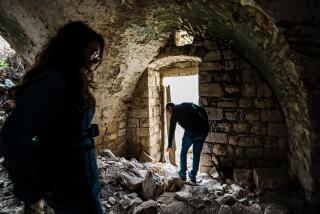Bomb Case Detainee’s Wife Keeps Brave Face
Mona Mayfield answered her front door with a smile and an outstretched hand, as if greeting a neighbor for afternoon coffee. She was pleasant and polite, going out of her way to make a stranger feel at home.
But her swollen eyes betrayed her. In a moment she was crying and barely able to speak.
“He did nothing wrong,” she said, her voice heavy with grief.
She was referring to her husband, Brandon Mayfield, a lawyer being held at the Multnomah County Detention Center as a material witness in connection with the March train bombings in Madrid. A fingerprint on a plastic bag led to his arrest.
Mayfield, 37, a Muslim convert, is the first American linked to the bombings.
Mona Mayfield covered her face, collected herself, apologized for her tears, and then asked her guest if he would like a cup of coffee.
This was the way her life had been for the last six days: one moment calm, the next surreal, colored with shock and disbelief. Mona and her three children, ages 10, 12 and 15, were still trying to comprehend what had happened, still struggling to wrap their minds around what some investigators said could be a case of immense magnitude in the war on terrorism.
Or it could be, and very likely is, Mona said, a colossal mistake.
She described her husband as a gentle, compassionate man devoted to helping the poor, a good father, husband and Muslim. She said he was not a fundamentalist, nor was he even particularly religious.
“And he was not violent at all,” she said. “In his life, he’s never been in a fight.”
Although he disagreed with U.S. foreign policy in the Middle East, and was concerned about purported constitutional violations related to the Patriot Act, Mona said, he believed America was “the best country in the world” with “the best legal system.”
FBI agents, who arrested Mayfield at his law office Thursday, said his fingerprint was found on a bag resembling a small garbage liner with a draw string. The bag, containing detonators, was found in a stolen van parked at a train station outside Madrid hours after the bombings that killed 191 people, injured 2,000 and contributed to the downfall of Spain’s ruling party in an election days later.
One U.S. official said there was disagreement within the FBI over the timing of Mayfield’s arrest. Agents in the New York field office wanted Portland FBI agents to monitor Mayfield longer before taking action, but the Portland agents, reportedly because of leaks to the media, felt compelled to act sooner than even they wanted to.
Mona said she suspected her family was being watched. On two occasions, she said, Brandon called the Multnomah County Sheriff’s Office to report unusual activity in and around their house. Mona did not elaborate. Police found nothing.
“It’s not his fingerprint,” said Mona, sitting in her sparsely furnished living room, which was dominated by an enormous, curved, olive-green sectional couch arranged to face an old television. A few framed art pieces with Arabic writing adorned the walls.
“If it is his fingerprint, then there’s a story there,” she said. The tone in her voice implied that it had to be a wild story. She said Brandon had never been to Spain, and that they hadn’t been out of the United States since 1993. Friends and family said it’s been two years since Brandon left Oregon.
There has been debate over the reliability of the fingerprint. Spanish authorities said it was not a conclusive match, and they had found no evidence that Mayfield had ever been to Spain. They also had found no connections between him and the other bomb suspects. One senior official, however, said Mayfield could have traveled clandestinely to Spain, using a false identity and fake documents.
U.S. officials said they continued to think the print was Mayfield’s, but they are also struggling to develop a theory. The possibilities range from Mayfield being an unwitting accomplice to him having been “completely involved” in the bombings, one official said.
Material-witness warrants are a tool -- much employed after the Sept. 11 attacks -- that enable the government to hold someone whose testimony is considered material to an ongoing criminal case and who is considered a flight risk.
In previous material-witness cases, judges have set strict deadlines for requiring prosecutors to get the witness before a grand jury, and to establish why that person should not be allowed to go free. The family was told Mayfield would face the grand jury Tuesday.
“I know he’ll be released,” Mona said. “I just hope it doesn’t take too long.”
Mona is 36, an Egyptian-born Muslim whose family immigrated to the United States when she was 4. She has large, expressive eyes, framed by wire-rimmed glasses. She wore a black cap that hid a huge mane of curly brown hair. She held her hands on her lap, squeezing and unsqueezing them.
Mona visited Brandon in jail Sunday. It was the first time she’d seen him since his arrest.
Brandon’s mother, AvNell Mayfield, who flew from her Kansas home to be with Mona, slipped into the room and listened in.
“It was one of the happiest days,” Mona said of seeing her husband. She said he was staying hopeful and confident that this whole thing would be cleared up soon. “He’s a very calm person.” She said they were both trying to stay calm for each other, and for the children.
Mona picked up a family photo on the coffee table. In it, Brandon was grinning and wearing a party hat. He is slender, about 5-foot-9, with light brown hair and a wispy beard. He grew the beard, she said, to look older.
“He was such a laid-back kid,” said AvNell Mayfield, an art teacher. She and Brandon’s father, Bill Mayfield, divorced when he was young, and Brandon and his two brothers split their time between her home in Hutchinson and their father’s home in Halstead, both in south-central Kansas.
Brandon joined the Army right out of high school.
He spent nine years in the military, rising to the rank of second lieutenant, and earning medals in sharpshooting and for good conduct. Mayfield served in Germany with an air-defense unit, and was part of a Signal Corps unit headquartered at Ft. Lewis Army Base in Tacoma, Wash. Investigators probably had access to Brandon’s fingerprints through his military records. While in the military, he met Mona, whom he married in 1989. After the Army, he attended college and law school.
His Portland practice centered on a program in which lawyers take referrals of low-income clients. Operating out of a two-room office near a strip mall, Mayfield built a practice representing people in immigration cases, landlord-tenant disputes and family law matters.
“He felt bad turning people away,” Mona said. “I told him ‘You need to stop doing that [taking every client]. We’re not making any money.’ He did it anyway.”
Some of his compassion, she said, grew out of his Muslim faith, which he embraced over many years. He was attracted to the upright life that went along with the faith. Neither she nor Brandon smoke or drink. His faith encouraged him to use his legal expertise to help the poor.
The mosque where Brandon worshipped was also attended by defendants in another terrorism case. Known as the “Portland Seven,” the six men and one woman pleaded guilty to federal charges of conspiring to wage war against the United States. One of the men was Mayfield’s client in a child-custody case.
Now, Mona said, her husband’s law practice is probably destroyed because of the bad publicity. Family friend and lawyer Thomas Nelson of Portland voiced the same concern, saying no client would want to be associated with a lawyer “even tangentially related to terrorism.”
The phone rang. Mona left the room, returning a few minutes later and putting away her cellphone. She commented that she and Brandon installed the carpet and built the walls in this room. But her house didn’t feel the same, she said. Not since the government agents conducted a 5 1/2-hour search through it last Thursday. The agents took computers, books “and lots of junk,” she said.
Since that day, she’s felt like a prisoner in her house. Reporters swarmed the house Thursday, Friday and Saturday. The family refused to answer the door. Helicopters hovered overhead. Mona says she leaves the house only when it is necessary.
As she spoke, her 12-year-old daughter, wearing a gray scarf over her head, scampered through the room, holding a black and white cat. She is so distraught she hasn’t returned to school.
The Mayfields live in a modest clapboard house in this working-class suburb about 10 miles west of Portland. Mona said it was a repossessed house in sad shape when they bought it two years ago. Mona and Brandon fixed up the interior themselves, and installed the new white vinyl siding on the outside.
A couple of other houses on the street have boarded-up windows. One block away is busy Highway 8, and on the other side, railroad tracks. A nearby Catholic church, according to a sign out front, has Masses in English, Spanish and Vietnamese.
The family owns five cats; a couple of them sprawled in the frontyard. The grass is overgrown. A soccer ball and some toys lay around the yard.
A car pulled up in the driveway. It was Brandon’s younger brother, Kent, who the day before arrived from Kansas to be with Mona and the kids. Kent and the two Mayfield boys remained in the car, waiting for a reporter to leave before getting out. In passing, Kent said he had been misquoted and would not talk to reporters unless it was “live video.”
Mona wandered out to the frontyard, glancing at the car and looking at her yard.
“Brandon was the one who mowed the lawn,” she said, her eyes tearing. She covered her face and again apologized.
Times staff writers Sebastian Rotella in Paris and Rick Schmitt in Washington, D.C., contributed to this report.
More to Read
Start your day right
Sign up for Essential California for news, features and recommendations from the L.A. Times and beyond in your inbox six days a week.
You may occasionally receive promotional content from the Los Angeles Times.






